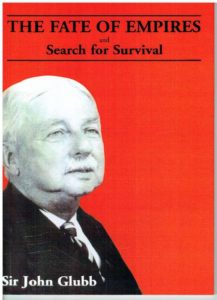This week’s selected media: July 2, 2023: The Fate Of Empires And Search For Survival, by Sir John Glubb and All The Wild That Remains Edward Abbey, Wallace Stegner, and the American West, by David Gessner
I read this week:

The Fate Of Empires And Search For Survival, by Sir John Glubb: I started this book expecting irrelevance. The preface describes the author as a British veteran of World War One. The book is twenty-five pages, talking about imperialism. What could he know? I figured, of course he’s viewing the world as an imperialist, likely racist and unsophisticated. Early on, he lists some empires and how long they lasted. I thought, “this list isn’t remotely scientific and is no basis for analysis.” He calls Native Americans savages. I figured I’d skim it to get it over with.
Then the descriptions foretell remarkably what has happened in the fifty years since publication, remarkably prescient and on schedule. It isn’t hard to translate from his language including terms like “race” and “stock” to the words we’d consider acceptable today, like “culture” and “of such-and-such descent,” since he’s not being racist. Does the following sound familiar?
Another remarkable and unexpected symptom of national decline is the intensification of internal political hatreds. One would have expected that, when the survival of the nation became precarious, political factions would drop their rivalry and stand shoulder-to-shoulder to save their country.
In the fourteenth century, the weakening empire of Byzantium was threatened, and indeed dominated, by the Ottoman Turks. The situation was so serious that one would have expected every subject of Byzantium to abandon his personal interests and to stand with his compatriots in a last desperate attempt to save the country. The reverse occurred. The Byzantines spent the last fifty years of their history in fighting one another in repeated civil wars, until the Ottomans moved in and administered the coup de grâce.
Britain has been governed by an elected parliament for many centuries. In former years, however, the rival parties observed many unwritten laws. Neither party wished to eliminate the other. All the members referred to one another as honourable gentlemen. But such courtesies have now lapsed. Booing, shouting and loud noises have undermined the dignity of the House, and angry exchanges are more frequent. We are fortunate if these rivalries are fought out in Parliament, but sometimes such hatreds are carried into the streets, or into industry in the form of strikes, demonstrations, boycotts and similar activities. True to the normal course followed by nations in decline, internal differences are not reconciled in an attempt to save the nation. On the contrary, internal rivalries become more acute, as the nation becomes weaker.
The book is filled with half-century-old quotes that read like current events. If he’s been this accurate for the past fifty years, the American empire would do well to learn from past empires, and fast, if changing our course from those he based his predictions on is possible.
I was recommended this book years ago. I wish I had read it earlier. You can download it free. Here is his obituary in the New York Times.
It doesn’t change my concern of another issue of greater importance that no empire or human society ever had to face, as best I can tell: drowning in toxic waste that won’t break down on human time scales. Societies have run out of resources, but combined with veins poisoned with plastic, PFAS, and more could result in a type of population collapse we’ve never seen before.
All The Wild That Remains Edward Abbey, Wallace Stegner, and the American West, by David Gessner: David was a guest on the podcast (the episode is still being edited) and we both played ultimate Frisbee to the point of it being one of the biggest parts of our lives. I liked his recent book A Traveler’s Guide to the End of the World, which we mostly talked about on the podcast, and his book about our sport, Ultimate Glory, so went for a third.
I confess I didn’t know about Edward Abbey and Wallace Stegner. Early in his book he points out how few people east of the Mississippi haven’t heard of them, though Stegner won a Pulitzer, a National Book Award the following year, and taught many great writers, including Ken Kesey and Larry McMurtry, whose works influenced me, and Edward Abbey. Abbey inspired Earth First and other movements.
I see in David’s writing huge inner torment that he wants to preserve he is actively destroying. I see what I see in American culture: not a lack of caring or intent, but suppressed or denied inhibition. He doesn’t want to give up flying, driving, and packaged food so he keeps funding the destruction he laments. I suspect that internally he convinces himself that individual action doesn’t matter, corporations are the cause, and all the other rationalizations and justifications I’m writing my book and leading my workshops to help people overcome so they can act with enthusiasm and confidence.
Read my weekly newsletter

On initiative, leadership, the environment, and burpees